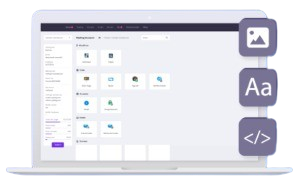Disclaimer: If you purchase via links on our site, we may receive affiliate commissions
Updated in April 2024
Top 10 Ecommerce plugin
Top 10 Ecommerce plugin
Ecommerce plugins have revolutionized the way businesses sell services and products online, providing robust tools for setting up and managing online stores. This article deals with the essence of eCommerce plugins, their benefits, necessity, pros and cons, top organizations in the field and the many types available in the market.

Top 10 Ecommerce plugin
What is an eCommerce plugin?
An e-commerce plugin is a software device or extension designed to combine with websites, specifically content management systems (CMS), to enable and enhance online sales capabilities. These plugins provide features including product listings, shopping cart controls, fee processing and order tracking, transforming a trendy website into a fully functional e-commerce platform.
Let’s get deep dive into the top 5 Best Ecommerce plugin
Features:
- BigCommerce offers a comprehensive eCommerce platform with functions such as multi-channel selling, customizable templates, integrated search engine marketing gear, and sturdy analytics.
Advantages:
- BigCommerce presents an all-in-one solution with scalable infrastructure, making it appropriate for companies of all sizes. It integrates seamlessly with primary marketplaces and social media structures, permitting businesses to reach a much wider target audience.
Use Cases:
- Ideal for organizations trying to scale their online presence, such as small to big enterprises. It’s ideal for people who need a sturdy and reliable platform to manipulate their on-line shops, integrate with other sales channels, and make use of advanced advertising gear.
Pricing:
- BigCommerce offers numerous pricing plans starting from $29/month to $299/month.
Features:
- WP EasyCart is a WordPress plugin that gives a complete suite of eCommerce functions, including product management, buying cart capability, order control, and payment gateway integration.
Advantages:
- WP EasyCart is straightforward to put in and use, making it perfect for small groups and startups. It integrates seamlessly with WordPress topics and plugins, supplying a customizable solution.
Use Cases:
- Suitable for small corporations and marketers who use WordPress and want a clean-to-put into effect eCommerce answer. It’s splendid for selling bodily merchandise, digital downloads, and services.
Pricing:
- WP EasyCart gives a free model with basic features, pricing start from $69.00/year to$89.00/year.
Features:
- WooCommerce is a powerful WordPress plugin that gives huge functions for creating an internet store, which includes customizable product pages, stable payments, configurable transport alternatives, and integrated advertising and marketing tools.
Advantages:
- WooCommerce is noticeably bendy and customizable, with a big network and great documentation. It gives numerous extensions and topics, allowing users to tailor their stores to precise wishes.
Use Cases:
- Ideal for companies of all sizes the usage of WordPress. It’s suitable for folks who want a pretty customizable and extendable eCommerce solution, whether for small shops or large-scale operations.
Pricing:
- WooCommerce offers plans from $10/month with the limited features.
Features:
- Shopify offers a comprehensive eCommerce platform with features like customizable storefronts, fee processing, inventory management, transport solutions, and advertising gear.
Advantages:
- Shopify is known for its ease of use, dependable overall performance, and tremendous app market. It offers sturdy customer service and a stable, scalable infrastructure.
Use Cases:
- Suitable for groups of all sizes, from startups to large establishments. It’s perfect for the ones seeking out a clean-to-use platform with robust multi-channel promoting skills and great help.
Pricing:
- Shopify offers several pricing plans starting from $20/month to $2300/month.
Features:
- SeedProd is a drag-and-drop WordPress web page builder with eCommerce talents. It gives functions like customizable landing pages, coming quickly pages, and upkeep mode pages, in addition to integrations with famous electronic mail advertising offerings.
Advantages:
- SeedProd is person-friendly and calls for no coding competencies, making it accessible for beginners. It integrates seamlessly with WooCommerce, allowing users to create excessive-changing income pages.
Use Cases:
- Ideal for WordPress customers who need to create expert-looking landing pages speedy. It’s best for businesses seeking to construct pre-launch pages, income funnels, and product promotion pages.
Pricing:
- SeedProd offers several pricing plans from $31.60/year to $239.60/year.
Benefits of an eCommerce plugin
The benefits of using an eCommerce plugin are numerous. First, it simplifies the way web storage is deployed, allowing agencies to quickly start promoting products without significant technical know-how. In addition, e-commerce plugins offer a wide range of options and customization alternatives that allow corporations to create a tailor-made shopping experience for their clients. Additionally, these plugins often include integrated tools for inventory management, sales analytics and marketing to help agencies streamline operations and make fact-based decisions.
Why do we need an eCommerce plugin?
In a brand-new digital age, a web presence is essential for agencies of all sizes. However, building an e-commerce website from scratch can be time-consuming and expensive. Ecommerce plugins are available here. By presenting a turnkey solution for e-commerce functionality, these plugins allow groups to gain awareness of what they do best – promoting products and services. Whether you are a small commercial business owner, a startup, or an established employer looking to expand online, eCommerce plugins provide a cost-effective and efficient way to enter the eCommerce market.
Advantages and disadvantages of an e-commerce plugin
Advantages
Like any technology, eCommerce plugins have their personal pros and cons. On the plus side, they offer ease of use, cost-effectiveness and scalability, making them accessible to a wide variety of groups. In addition, e-commerce plugins integrate seamlessly with numerous CMS frameworks, providing flexibility and customization options to meet the specific wishes of a business.
Disadvantages
However, relying only on eCommerce plugins can also create limits when it comes to advanced features and custom features. In addition, several plugins may also be compatible with certain website structures or require additional costs for premium features and add-ons.
Types of Ecommerce Plugin
E-commerce plugins can be broadly divided into main types: specific CMS plugins and stand-alone e-commerce systems.
CMS-Specific Plugins: These plugins are designed to integrate with precise content management systems and enhance their e-commerce functionality. Examples include WooCommerce for WordPress, etc.,
Standalone Ecommerce Platforms: These are comprehensive ecommerce solutions that include hosting, website building, and a multi-functional package of ecommerce features. Examples include Shopify, BigCommerce, etc.,
Conclusion
In conclusion, eCommerce plugins have become a critical device for organizations that want to sell products and services online. By providing a range of functions and features, these plugins simplify the way online stores are deployed and handled, enabling organizations to recognize booms and customer engagement. However, it is important for agencies to choose the right e-commerce plugin for their needs and integrate it effectively with their existing website infrastructure. With top corporations in the field constantly innovating and improving their offerings, the future of e-commerce looks promising with e-commerce plugins.
















